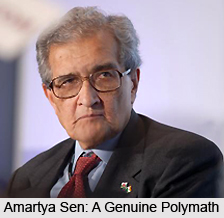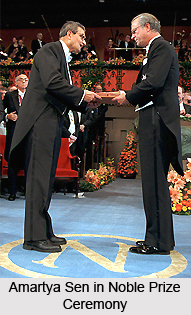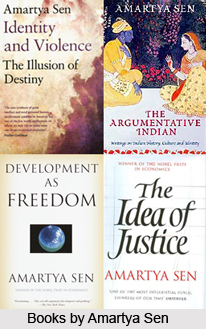 Amartya Sen is known as "the Mother Teresa of Economics" for his work on famine, human development theory, welfare economics, and the underlying mechanisms of poverty, gender inequality, and political liberalism. Born on 3 November 1933 he is currently the Thomas W. Lamont University Professor and Professor of Economics and Philosophy at Harvard University. He is also a fellow of Trinity College at the University of Cambridge, where from 1998 to 2004 he was Master, the first Indian academic to head an Oxbridge college. In 1998, Sen won the Nobel Memorial Prize in Economics for his contributions to work on welfare economics.
Amartya Sen is known as "the Mother Teresa of Economics" for his work on famine, human development theory, welfare economics, and the underlying mechanisms of poverty, gender inequality, and political liberalism. Born on 3 November 1933 he is currently the Thomas W. Lamont University Professor and Professor of Economics and Philosophy at Harvard University. He is also a fellow of Trinity College at the University of Cambridge, where from 1998 to 2004 he was Master, the first Indian academic to head an Oxbridge college. In 1998, Sen won the Nobel Memorial Prize in Economics for his contributions to work on welfare economics.
"Social choice theory related importantly to a more widespread interest in aggregation in economic assessment and policy making (related to poverty, inequality, unemployment, real national income, living standards)" as said by Amartya Sen. Social choice theory studies voting rules for how individual preferences are aggregated to form a collective preference. Sen`s contribution to the literature enriches the theory of social choice. Sen points that there are a number of social and economic factors, such as declining wages, unemployment, rising food prices, and poor food-distribution systems etc behind the issues which led to starvation among certain groups in society. Amartya Sen`s revolutionary contribution to development economics and social indicators is the concept of `capability` which is a conceptual frame work for evaluating social states in terms of human welfare.
 Amartya Sen`s books have been translated into more than thirty languages. He is a trustee of Economists for Peace and Security. He has received over 80 honorary doctorates. In the year 2010, Time magazine listed him among the 100 most influential persons in the world.
Amartya Sen`s books have been translated into more than thirty languages. He is a trustee of Economists for Peace and Security. He has received over 80 honorary doctorates. In the year 2010, Time magazine listed him among the 100 most influential persons in the world.
Early Life of Amartya Sen
Amartya Kumar Sen, an Indian economist and a winner of the Nobel Prize was born on 3rd November 1933 in Santiniketan, West Bengal. His ancestral home was in Wari, Dhaka in modern-day Bangladesh. His family migrated to India following partition in 1947. Rabindranath Tagore is said to have given Amartya Sen his name "Amartya" meaning "immortal". Sen`s maternal grandfather Ksitimohan Sen was a renowned scholar of medieval Indian literature. Amartya Sen was born to professor father Ashutosh Sen, who taught Chemistry at Dhaka University and mother Amita Sen. St Gregory`s School in Dhaka in modern-day Bangladesh was Amartya Sen`s high-school. Before moving to Trinity College, Cambridge Sen studied in India at the school system of Visva-Bharati University and Presidency University, Kolkata, where he earned a First Class BA in 1953. At Trinity College he received B.A in 1956 and then a Ph.D. in 1959. He was also allowed four years to immerse himself in philosophical issues during his stay at Trinity College.
He has taught economics at University of Calcutta, Jadavpur University, Delhi, Oxford where he was first a Professor of Economics at Nuffield College and then the Drummond Professor of Political Economy and a Fellow of All Souls College, London School of Economics, Harvard and was Master of Trinity College, Cambridge, from 1998 to 2004. In January 2004 Sen returned to Harvard. He is also a contributor to the Eva Colorni Trust at the former London Guildhall University.
 Personal Life of Amartya Sen
Personal Life of Amartya Sen
Indian writer and scholar Nabaneeta Dev Sen was his first wife with whom he had two children Antara and Nandana. Antara is renowend Indian journalist and Nandana is a bollywood actress. But their marriage broke up after they moved to London in 1971. Eva Colorni was his second wife with whom he had two children, Indrani and Kabir. Indrani is a journalist in New York and Kabir teaches P.E in the Boston area. Eva died from stomach cancer in 1985. An economic historian, an expert on Adam smith and Fellow of King`s College, Cambridge the Hon. Emma Georgina Rothschild is his present wife.
Honours and Awards for Amartya Sen
* He received the Nobel Memorial Prize in Economics for his work in welfare economics in 1998.
* In 1999 he received the Bharat Ratna `the highest civilian award in India` by the President of India.
* In 1999 he was offered honorary citizenship of Bangladesh from Prime Minister Sheikh Hasina in recognition of his achievements in winning the Nobel Prize, and given that his family origins were in what has become the modern state of Bangladesh
* He received the 2000 Leontief Prize for his outstanding contribution to economic theory from the Global Development and Environment Institute.
* He was the 351st Commencement Speaker of Harvard University.
* In 2002 he received the International Humanist Award from the International Humanist and Ethical Union.
* Eisenhower Medal, for Leadership and Service USA, 2000;
* In 2002, he received an honorary degree from the university of Tokyo
* In 2003, he was conferred the Lifetime Achievement Award by the Indian Chamber of Commerce.
* Life Time Achievement award by Bangkok-based United Nations Economic and Social Commission for Asia and the Pacific (UNESCAP)
Works by Amartya Sen
* Choice of Techniques, 1960
* An Aspect of Indian Agriculture
* The Argumentative Indian
* Commodities and Capabilities
* Growth Economics
* Identity and Violence: The Illusion of Destiny
* Collective Choice and Social Welfare
* On Economic Inequality
* Poverty and Famines: an Essay on Entitlement and Deprivation, 1981.
* Poverty and Famines: An Essay on Entitlements and Deprivation
* Choice, Welfare and Measurement
* Food Economics and Entitlements
* Hunger and Public Action
* Hunger and Public Action
* "More Than 100 Million Women Are Missing".
* Inequality Re-examined
* India: Economic Development and Social Opportunity






